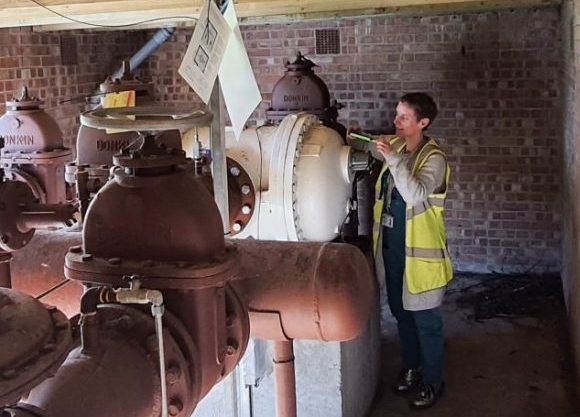
I’m one of DIO’s seven Area Utility Managers (AUMs) operating in the south west of England. I, along with the other AUMs in the team cover a geographic triangle from Culdrose in the south west, to Portsmouth in the east, and up to Ashchurch, just north of Cheltenham. Together, we look after around 60 sites.
Across the south west, our sites range from Portsmouth and Devonport naval bases to munitions depots, historical buildings such as the Royal Citadel and museums such as the Royal Electrical Mechanical Engineers (REME) Museum. This is in addition to the routine accommodation, training facilities and offices we have been enthusiastically tending to for the last seven years, to make sure the Defence estate is as sustainable as it can be.
My role as a Utility Manager
I focus on reducing water consumption and waste and the use of fossil fuels and electricity across the MOD estate. This is an important component of MOD’s sustainability agenda and the government’s commitment to achieve net zero emissions by 2050. I work alongside site management teams, facilities management contractors, project teams and the MOD infrastructure teams. I regularly carry out data analysis on utility consumption and occasionally can be found dressed head to toe in PPE covered in cobwebs whilst trying to take manual gas meter readings. Each site has its own set of net zero challenges, for example at the Royal Citadel (much of which dates from the 17th century) we are prevented from installing double-glazing, thermal insulation or solar panels due to the listed building status. Some projects I’m currently working on include the Modern Energy Partners de-carbonisation pilot at HMS Collingwood, the installation of automatic meter readers on gas meters and assisting HMNB Portsmouth to achieve their net zero carbon targets by taking steps to minimise wasted heat in buildings amongst other ventures.
We have a range of targets that must be achieved and some of these include:
- Decreasing water consumption by 15% by April 2021 - so far we’ve achieved 11.4%.
- Moving less than 10% of waste to landfill, increasing the amount we recycle and reduce the amount of waste that we produce. In April 2020, we achieved 7% of waste to landfill, recycled 56% and reduced produced waste by 38%.
- Reducing green house gas emissions by 40% by April 2021. In April 2020, we exceeded this target by achieving 47.6%.
- Reducing energy consumption by 10% by April 2026 - in April 2020 we achieved 2.4%.
At the moment, climate change is a hot topic and as a government department we’re committed to reducing our carbon footprint, moving towards a low carbon society and using renewable energy sources. Some exciting projects we’re embarking on include installing solar panels at 76 sites for the British Army. We’re also looking at implementing solar carports for electric vehicle charging and utilising heat pumps for heating and hot water.
Individually, we need to take responsibility for how we use and manage utilities at work and home. The easiest solution is to use less, thinking about when you use energy and water and how you are disposing of waste. There are simple ways you can do this like switching off lights and turning off taps and equipment when they are not required, so why not start by taking these small steps now to help reduce your carbon footprint?
1 comment
Comment by Gareth Young posted on
The new replacement for gas fired boilers in district heating mode or standalone will greatly reduce energy bills and c02 emissions on MOD estates.
I’m talking about heat pumps coupled with Interseasonal Energy Transfer and solar panels.
With careful design, it’s possible to achieve very impressive annual spf or cop numbers.